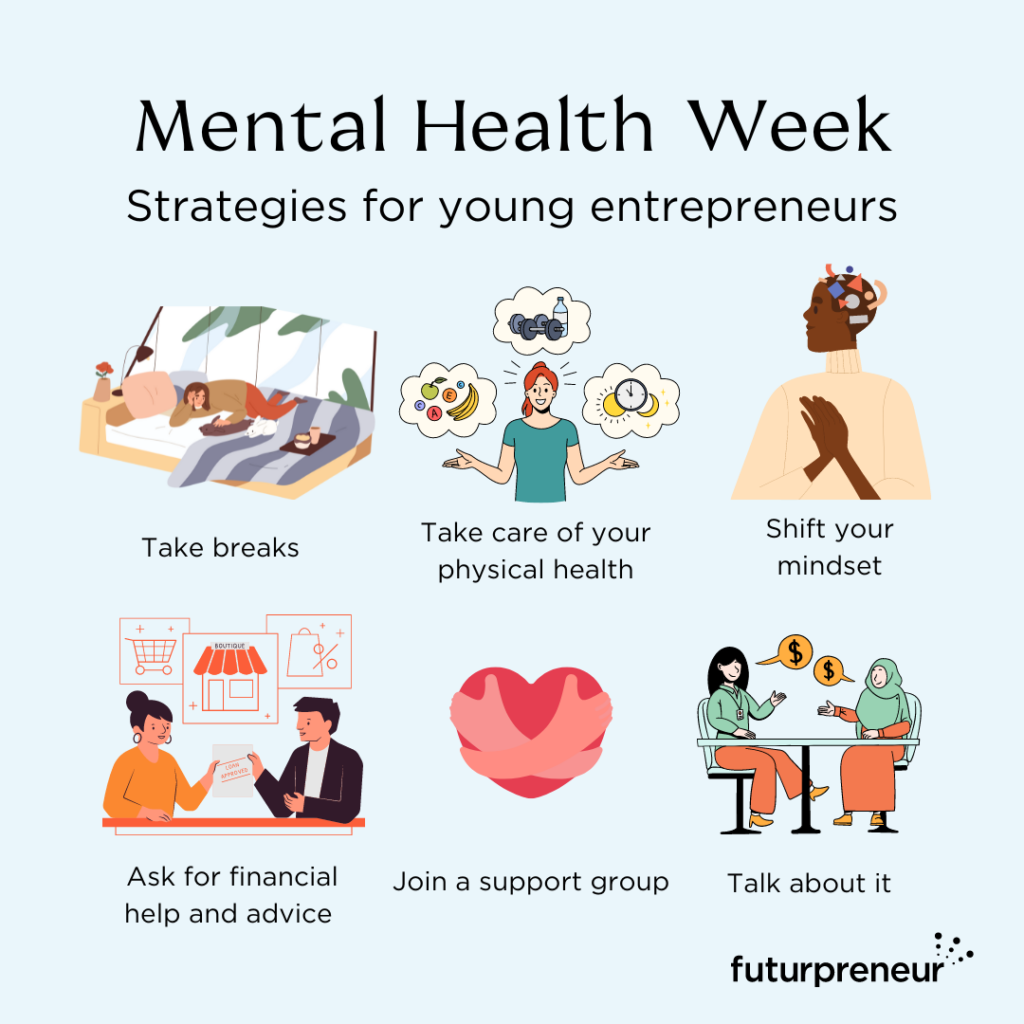You know that marketing plan you just can’t seem to finish? Or your inability to get a good night’s sleep, or that ongoing, low-grade headache you can’t seem to shake? Those are all very common signs of stress.
There was a time when entrepreneurs of any age avoided speaking about their mental health issues due to a very real stigma. Today, thanks to the willingness of young entrepreneurs to talk and share openly, the topic is slowly becoming front-and-centre at startup networking events, business conferences, on entrepreneur-related blogs, and across social media. Today, most governments, organizations and small businesses recognize stress and anxiety are mental health issues. They exist in every area of business, impact bottom lines and affect people’s quality of life.
Yet, according to a 2023 study conducted by our partner, Business Development Bank of Canada (BDC), Canada’s only bank exclusively devoted to entrepreneurs, specifically, young business owners experience more mental health challenges than others — and they’re less likely to access support. Of even more concern, the study showed the mental health of many young entrepreneurs declined significantly year over year.
Good stress vs. bad stress
Not all stress is bad. In many cases, acute (short-term) stress can inspire, motivate and help us focus our energy and enhance our performance. But it can be challenging to pinpoint concrete causes of good or bad stress because everyone has a different stress threshold and response.
For example, a new plan to expand your small business might mean extreme stress for you, while another may look at it as an exciting opportunity. Planning a business development event could cause one person “bad” stress while another enjoys the rush and finds the “good” stress inspiring and motivating.
Chronic stress — in some cases, even of the positive kind — can negatively impact your physical and mental health. Here are seven ways you can reduce your stress and protect your mental health so you can enjoy — not dread — navigating your startup journey.
1. Take more (or at least a few) breaks
Many young entrepreneurs are reluctant to take even one day away from their businesses, but regular breaks are vital for your mental health, even if you’re not necessarily feeling stressed. Your body is designed to respond to short bursts of good stress — but even good stress, when prolonged, can become chronic and unhealthy.
If a full-blown vacation isn’t possible, a staycation can do the trick — engage in some self-care, meet friends for lunch, spend time outside or binge-watch movies. When you’re taking a break, turn off your notifications or better yet, ignore business emails, and leave your laptop behind where possible — it’s not a true break if you’re spending time thinking about work.
2. Take care of your physical health
Regular exercise is a great way to let off steam, clear your head and improve your mood. Throughout the day, strive to move your body at least once an hour — take a short walk, do some yoga or dance around the house or office to your favourite tunes. Get at least 30 minutes of exercise most days of the week.
A healthy diet is also good for your mental health. Consider weekly meal prepping to get ahead of the “what’s for dinner” game, which is a real source of stress — and fast-food binges — for many. For some tips and inspo, check out these meal-prep YouTube videos.
Finally, get ample sleep, which is essential for optimal physical and mental health — and a better mood. Go to bed and get up at the same time every day to help your mind and body get into a solid sleep routine.
3. Shift your mindset
A healthy perspective can help reduce your stress. Start by acknowledging your accomplishments, and work to keep your perfectionist tendencies in check. Reframe negative experiences to find the opportunities in them. If you have the bandwidth or financial wherewithal, consider cognitive behavioural therapy (CBT) or free resources like those offered by the Canadian Mental Health Association (CMHA).
If you’re stuck in a dark place, plant yourself in the present moment — pet the dog, hug the kids or indulge in a really great cup of coffee to help lighten your mood. Practice daily gratitude to help shift your mindset to one of abundance. Consider starting a gratitude journal, in which you list the things you feel gratitude for. You’ll find there are no shortage of ways or tools you can use to help you get yours going.
4. Don’t go it alone
Feelings of isolation contribute to stress for entrepreneurs, and nurturing your relationships with friends and family can help ensure you have someone to talk to about both business and personal issues. Be realistic about what you need to handle personally, and in business, and delegate tasks to your staff or external contractors where feasible.
5. Talk about it
It’s important as a young entrepreneur to speak honestly about your struggles. If someone asks, “How are you doing?” (and really wants to know), it’s okay to say, “Not so great.” As the saying goes, it’s okay to not be okay.
If you feel like you don’t have anyone to talk to, candidly, this is another instance where you may want to consider online therapy — especially during periods of high stress. Executive coaching can also be a great way to get support on your entrepreneurial journey.
6. Join a support group
If you’re feeling the stress of running a business or you lack work-life balance, you can be sure there are other young entrepreneurs who feel the same way.
Look for groups who gather in your area to discuss similar issues and solutions. They don’t have to specifically be support groups. Networking groups that meet regularly can also help you cultivate relationships with other entrepreneurs and provide you with opportunities for helpful discussions and interactions. Talking to your peers who may be facing similar challenges or problems to you can be powerful and difference-making.
Not ready to speak your truth in person? You can look online for support groups made up of others feeling the pressures of being a young entrepreneur.
7. Ask for financial help and advice
Money is a major stressor for any entrepreneur. If you’re experiencing challenges with cash flow, revenue generation or your supply chain, there may be ways your suppliers, lenders and ecosystem can help — but you won’t find out unless you ask.
Your lenders may suggest solutions that you had no idea were even options, including restructuring loans, deferring payments, delaying shipments or financing purchase orders. For example, during the 2023 summer wildfires, which affected small businesses across Canada, here at Futurpreneur, we provided relief programs to entrepreneurs who were affected, either directly or through their supply chain. It’s always worth exploring how your ecosystem can support you through tough times.


